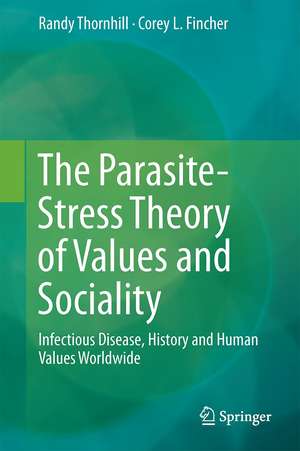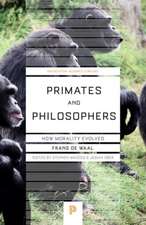The Parasite-Stress Theory of Values and Sociality: Infectious Disease, History and Human Values Worldwide
Autor Randy Thornhill, Corey L. Fincheren Limba Engleză Hardback – 31 iul 2014
| Toate formatele și edițiile | Preț | Express |
|---|---|---|
| Paperback (1) | 1224.99 lei 6-8 săpt. | |
| Springer International Publishing – 9 sep 2016 | 1224.99 lei 6-8 săpt. | |
| Hardback (1) | 1229.10 lei 6-8 săpt. | |
| Springer International Publishing – 31 iul 2014 | 1229.10 lei 6-8 săpt. |
Preț: 1229.10 lei
Preț vechi: 1498.90 lei
-18% Nou
Puncte Express: 1844
Preț estimativ în valută:
235.21€ • 244.17$ • 196.13£
235.21€ • 244.17$ • 196.13£
Carte tipărită la comandă
Livrare economică 25 martie-08 aprilie
Preluare comenzi: 021 569.72.76
Specificații
ISBN-13: 9783319080390
ISBN-10: 3319080393
Pagini: 449
Ilustrații: XIX, 449 p. 12 illus.
Dimensiuni: 155 x 235 x 32 mm
Greutate: 0.77 kg
Ediția:2014
Editura: Springer International Publishing
Colecția Springer
Locul publicării:Cham, Switzerland
ISBN-10: 3319080393
Pagini: 449
Ilustrații: XIX, 449 p. 12 illus.
Dimensiuni: 155 x 235 x 32 mm
Greutate: 0.77 kg
Ediția:2014
Editura: Springer International Publishing
Colecția Springer
Locul publicării:Cham, Switzerland
Public țintă
ResearchCuprins
1. Background and Overview of the Book.- 2. Evolutionary Aesthetics, Values and Methodology.- 3. The Parasite-stress Theory of Values.- 4. Human Values Research Prior ro the Parasite-stress Theory.- 5.Collectivism–Individualism, Family Ties and Philopatry.- 6. Mating Systems, Mate Choice, Marriage, Sexual Behavior and Inbreeding.- 7. Personality.- 8. Interpersonal Violence.- 9. Religiosity.- 10. Democracy and Other Governmental Systems.- 11. Economics, Values and Cognitive Ability.- 12. Wars, Revolutions and Coups, and the Absence of Peace across the World.- 13. Biodiversity and the Parasite-driven Wedge.- 14. Reflections, Criticisms, and Future Research.
Recenzii
“The book might appeal to academics looking for an introduction to this research program, for example, psychologists, anthropologists, sociologists, or political scientists concerned with cultural differences and seeking an alternative perspective. … The volume has much to offer for fans of consilience. … The book also has much to offer for those skeptical of parasite stress having such encompassing effects on culture as well as for those skeptical of the psychological processes claimed to cause the cultural variation.” (Florian van Leeuwen, The Quarterly Review of Biology, Vol. 91 (2), June, 2016)
Notă biografică
Randy Thornhill is Distinguished Professor of Biology at The University of New Mexico. Dr. Thornhill's 150+ published papers and four books on the evolutionary and ecological aspects of sociality and behavior have been cited over 17,000 times. He served as President of the Human Behavior and Evolution Society from 2011 through 2013. Corey L. Fincher is an Assistant Professor in the University of Warwick, U.K.'s Department of Psychology. The parasite-stress model emerged as a result of his and Thornhill's research, and the two researchers' publications since 2005 established this theory of sociality.
Textul de pe ultima copertă
Why do some people pray more than others? Why do some people prefer to be with healthier-looking people? Why are some people more conservative than others? Why does the prevalence of violence vary across the world? Why are some countries poor while others are increasingly wealthy? Why are some countries mired in corruption? Randy Thornhill and Corey L. Fincher argue that the answers to these questions, and many more about the human condition, come down to understanding how infectious diseases have shaped human behavior and psychology. Paramount to this view is that other human beings are often the harbinger of infectious diseases, which has profound implications for the evolution of human sociality. In The Parasite-Stress Theory of Values and Sociality: Infectious Disease, History and Human Values Worldwide, the authors bring a wealth of evidence from across many scholarly fields, much of which has been produced in the last decade, to support this claim. Read this book to learn how infectious diseases have shaped human emotions, morality, political and cultural values, personality, family ties, mate preferences and sexuality, religiosity, intergroup psychology, governmental systems, trade, war, economic development, intelligence and innovation, and biodiversity, and more.
Randy Thornhill serves as Distinguished Professor of Biology at the University of New Mexico. Corey L. Fincher is an Assistant Professor in Psychology at the University of Warwick.
Randy Thornhill serves as Distinguished Professor of Biology at the University of New Mexico. Corey L. Fincher is an Assistant Professor in Psychology at the University of Warwick.
Caracteristici
Builds the revolutionary theory that human evolution is subject to parasite and disease stress that shapes human qualities as personality, political tendencies and propensity toward religiosity
Comprehensive coverage of the topic and its underpinnings and wide scope including value systems, mate choice, political preferences, personality, religiosity and economics
The summation of years of field-defining work by Thornhill and Fincher
Comprehensive coverage of the topic and its underpinnings and wide scope including value systems, mate choice, political preferences, personality, religiosity and economics
The summation of years of field-defining work by Thornhill and Fincher












